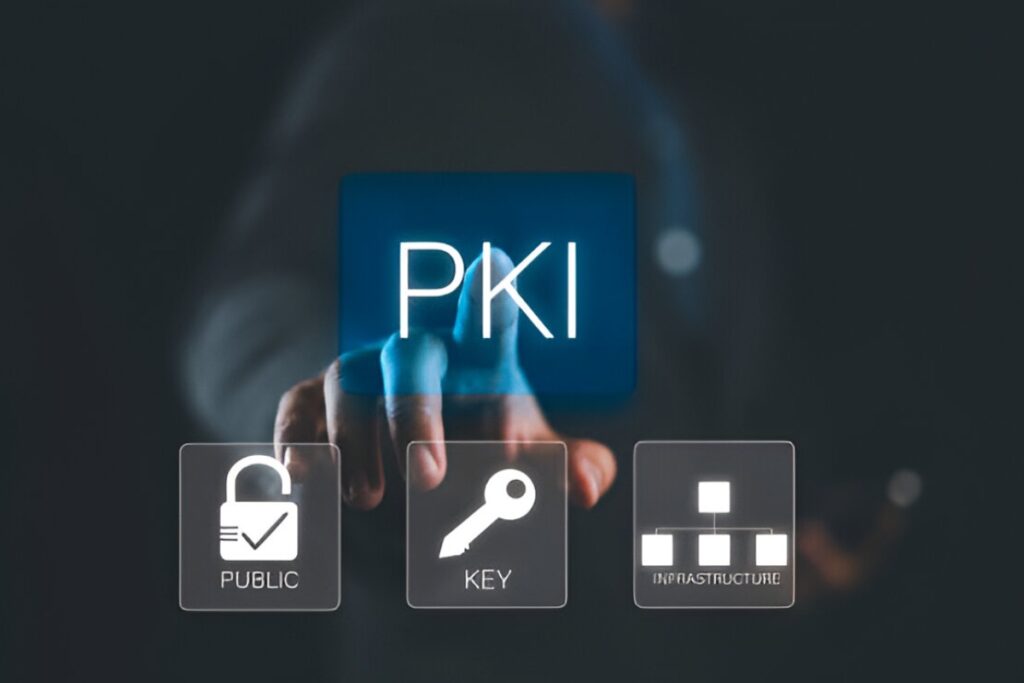In today’s digital world, security is of the utmost importance for companies of all sizes. Public Key Infrastructure (PKI) is a influential tool for defensive sensitive information and ensuring encrypted communications. Managed PKI enables secure data transfer across networks by providing a platform for managing digital certificates and public key encryption.
On the other hand, internally managing PKI can be time-consuming and complex.
Organisations can take advantage of managed PKI services, which offer a simple and effective answer to this problem. While managed PKI services handle deployment, maintenance, and grading, companies can focus on their core business and be confident in their comprehensive security.
What is a Managed PKI?
Secure certificate-based authentication in public key cryptography is based on a public key infrastructure (PKI). However, you need to choose which infrastructure is more suitable for your organisation’s certificate implementation: a closed PKI or a managed PKI. To make this choice, you need to know what an MPKI is.
Some companies cannot use public key infrastructure (PKI) because of the high cybersecurity expertise required to manage it. MPKI simplifies the process by eliminating the need for maintenance and deployment.
A separate organisation develops managed PKIs. As a result, your IT department does not need to worry about creating and maintaining a PKI, as we have already taken care of this. You do not need additional staff to keep the PKI running.
Cloud hosting is also a shared choice for managed PKI services. It provides high availability and scalability from anywhere in the world. You can evade the hassle of setting up a separate PKI for each location. This article will shelter five key benefits of using a managed PKI.
1. Enhanced Security and Compliance
Managed PKI greatly improves the issuance, management, and revocation of digital certificates. Thanks to the strict security protocols used by managed PKI services, cryptographic keys and certificates are protected from unauthorised access and manipulation. Companies can mitigate risks such as data breaches and cyber attacks by using managed PKI.
Companies in highly controlled industries such as healthcare, banking, and the public sector rely on managed PKI to comply with all applicable standards and requirements.
Using PKI for encryption and digital autographs is one of the robust security measures required to comply with GDPR, HIPAA, and PCI-DSS regulations. Managed PKI providers ensure compliance with the latest rules and best practices for businesses.
2. Rapid Product Launch and Scalability
You can begin implementing device provisioning faster and cost-effectively with a managed PKI solution than with an in-house solution. To speed up the process, you don’t have to go through all the steps associated with recruiting staff, setting up equipment, and setting up technology and methods.
In addition, using internal PKI can make it problematic to adapt to changes in the market or goals due to the extensive preparation and infrastructure required. However, with a managed PKI service, you can easily scale the number of identities you provide.
3. Hardware Security Modules
Secure cryptographic operations are performed by hardware security modules (HSMs), which can be custom peripheral cards or devices and are used by managed PKIs. Hardware security modules (HSMs) are expensive but are necessary to protect cryptographic operations and keys from prying eyes.
The initial capital expenditure (CAPEX) for an HSM is borne by the organisation implementing its own PKI solution. On the other hand, IoT platform providers can store HSM keys using a pay-as-you-go model when subscribing to managed PKI services.
4. Managing Certificate Authorities and Certificate Lifecycle Management
When building an internal PKI, managing device identities throughout an IoT device’s lifecycle becomes increasingly complex. A managed PKI service can track digital certificates as they are issued, renewed. Used, and potentially misused to maintain trust in the public key infrastructure. If certificates are compromised, hackers can breach secure environments. A managed PKI service maintains a certificate revocation list and identifies certificates that have been compromised or distorted and should no longer be trusted. This helps prevent such incidents.
The WebTrust program for certificate authorities was created by the Association of Certified Public Bookkeepers (AICPA) and the Canadian River Institute of Chartered Accountants (CICA) to ensure that managed PKIs comply with best practices for issuing, managing, and revoking certificates. With this type of authentication, you can be confident that the certification authority takes all precautions to ensure systems and data security.
5. Applicable Delivery Options
A managed PKI service is expected to support both factory and cloud-based on-premises provisioning. Throughout factory provisioning. Security keys are embedded into hardware via one-time programmable chips, binding device identities to the device throughout production. Additionally, authorised individuals can only gain access through a key injection process, adding a layer of security.
Using third-party manufacturers with weak security standards is just one example of how the device supply chain can introduce extra layers of complexity and reduce security. To address this issue, managed PKI enables cloud-based on-premises provisioning to create identities remotely. The process begins during production, when a device is assigned a bootstrap key as its minimum identifier. Once deployed to the field, the device can be verified, and its whole secure identity can be ensured through cloud provisioning.
Finally!
Implementing a managed PKI can improve an organisation’s security, certificate management, scalability, flexibility, cost-effectiveness, and access to professional support. With managed PKI services, companies can focus on what they do best while maintaining robust security measures.
Having a reliable managed PKI provider can make all the difference when protecting sensitive information from the ever-changing digital landscape. Any company, regardless of size, can reap the long-term benefits of investing in a managed PKI.
Also Read: 5G Technology


